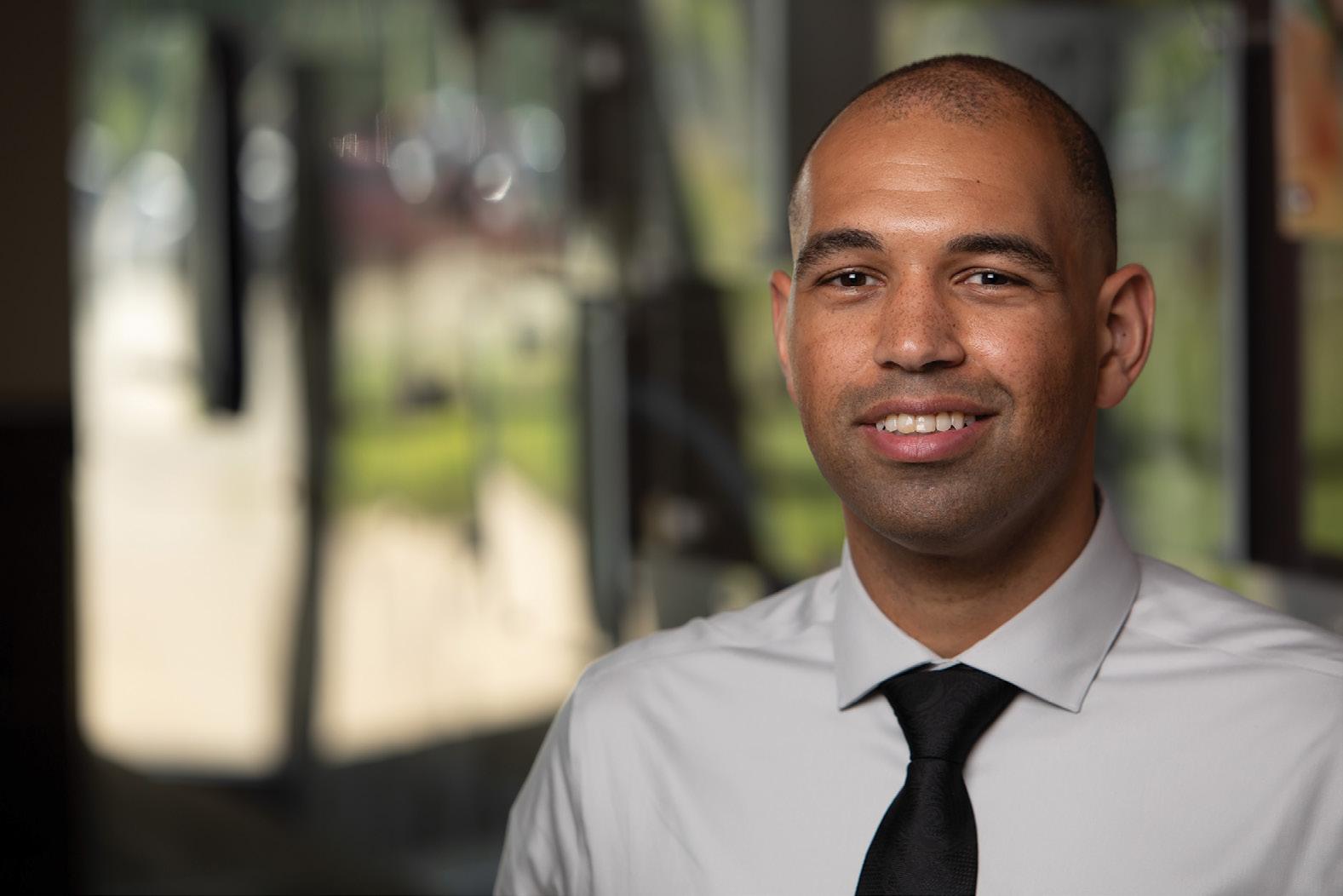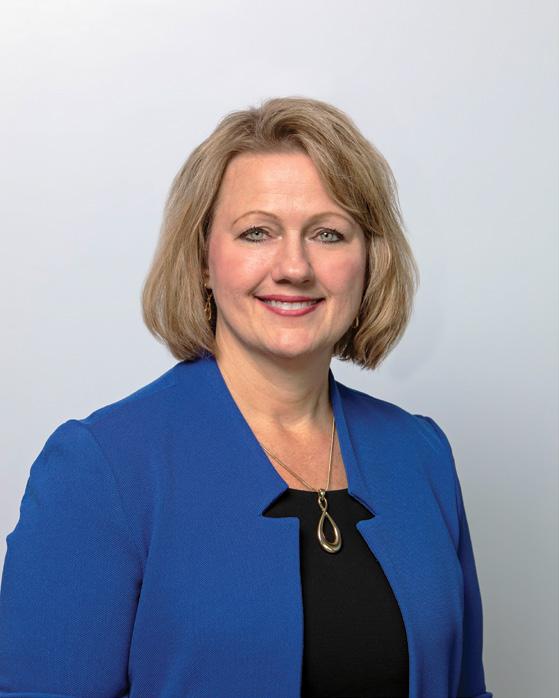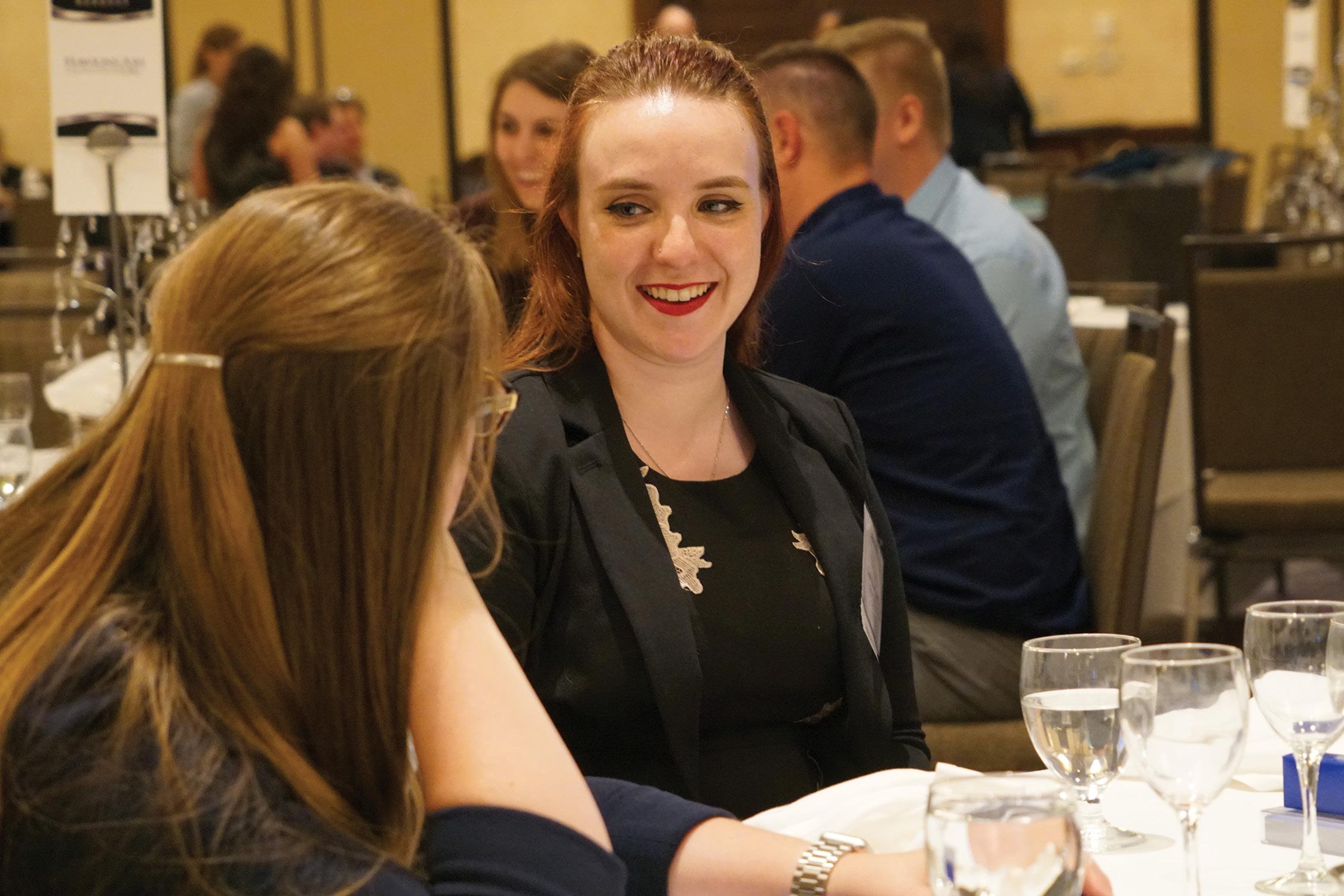
11 minute read
member profile
from CPA2b Magazine - Fall 2021
by WICPA
Photography by John Sibilski

REAPING THE BENEFITS OF ADVERSITY
This future CPA came back from a serious injury to combine military service with his education.
By Marcia Tillett-Zinzow

Multitasking takes on a whole new meaning once you’ve met Che Martinson, an accounting and information systems (IS) student at the University of Wisconsin–Oshkosh. Not only is he carrying two majors, he’s also a “weekend warrior,” serving in the U.S. Marine Corps Reserves one weekend a month and two to three weeks every summer.

Che, 32, who grew up in Madison and attended James Madison Memorial High School, started his college career a little later than most due to an unexpected event. “In my senior year, I suffered a very serious work injury and had to take a year off. I was in constant pain, and the long recovery left me struggling with depression as well,” he said. “School became less of a priority for me, and I ended up obtaining a high school equivalency diploma (HSED) instead of graduating in 2007 with my class.” The injury occurred while Che was working at a part-time job on a loading dock. A piece of equipment broke as he was helping to move a 3,000-lb. crate, and the load fell on him, completely shattering his knee. He endured extensive surgeries to reconnect bone fragments and reconstruct his knee. Che continued to struggle with chronic pain and depression from his injury over the next several years. He did what he could and picked up some odd jobs here and there. “I don’t regret that, because I feel like it widened my worldview and introduced me to the workforce, so I could figure out what I really wanted to do,” he said.
Building endurance
When he started feeling better, Che began taking a few courses at Madison Area Technical College (MATC). Then he walked into a Marine Corps recruiting office to explore a potential military career. “It was a transformative moment for me,” he said. “The recruiter helped me decide on the Marine Corps Reserves so I could still go to school and be able to take advantage of GI tuition benefits.” Because he was still recovering from the injury, Che spent almost a year in physical training before his recruiter determined he was ready to ship off to boot camp. “Luckily, my surgeons had used biodegradable ‘smart pins’ instead of metal to reconstruct my knee,” Che said, noting that military enlistment isn’t possible if you have metal in your body. Biodegradable – or bioabsorbable — pins and screws used in orthopedic surgery eventually dissolve and are absorbed by the body. So Che was good to go. Today, in addition to being an accounting and IS student at UW–Oshkosh, Che is a machine gunner in
Che Martinson will graduate from UW–Oshkosh in December. He also serves as a machine gunner for the U.S. Marine Corps Reserves.


Che is a corporal in the U.S. Marine Corps Reserves.
the Marine Corps Reserves with the rank of corporal. One weekend of every month, he heads to the U.S. Marine Corps Reserve Center in Madison to check in for the weekend drill — which generally lasts from Thursday through Sunday. His military service requires 54 days of scheduled weekend drills and a two-week training stint in summer.
The two-week training session makes it nearly impossible to take classes in the summer, and during regular semesters it hasn’t been easy to juggle academic obligations with military service. “It always seems like I’ll have a four-day training period from Thursday through Sunday that exhausts me mentally and physically, and then I’ll have an exam sharp on Monday or Tuesday morning,” he said. There have been many nights when he has crammed a study session in before the weekend drill or in the frantic few hours after the drill and before class, he said. Add to this the physical standards required by the Marine Corps. “That means I have to also plan several hours in the gym and running trails every week on my own time to weave in between studying and school,” said Che. “The dual responsibilities always seem to be pulling me in different directions, but I really appreciate the endurance it has instilled in me.”
As a result, Che is able to work long, extended hours and for periods under pressure, and he has learned some strong time management skills. “It’ll be interesting to see how I do in a 40-hour-aweek job because I’m so used to sometimes waking up at 6 a.m. and studying well past midnight – and somehow fitting a two-hour gym or running session in there as well,” Che said.


Choosing accounting — and technology
As a child, Che was always interested in puzzles and patterns — elements found in accounting — but he noted that his interest in the profession didn’t really peak until after he was injured on the loading dock. “During my recovery, the company had to find something else for me to do, so they put me in the Accounting Department working with the cash-over and -short reports. I’d get lost in the forensic aspect of the work, tracing where a cash shortage was or where an overage originated within the company.” The concept of “balance” intrigued him. “When changes are made in one area, you account for the effects of the change in one or more other areas, and the pieces just interlock and work out together,” he said. “It’s fascinating.” Che will graduate in December, and he plans to move forward with the CPA Exam right away because he sees it as a vital credential that will open many doors for him — as will his dual degree in accounting and IS.
“In the future, I would like to leverage both accounting and information systems backgrounds to work as a business systems analyst and integrate both the financial and technological sides of a business.” It’s a fact that many accountants currently are not well schooled in technology and that many technology professionals are green when it comes to the accounting and finance aspects of busines. It’s also true that the automation of many accounting tasks is quickly and inextricably linking technology with accounting. “So a lot of businesses are saying, ‘Hey, we can use business systems analysis to help plug the gap between those two departments,’” Che noted.

A machine gun-line at Camp Pendleton, California, Infantry Training Battalion.
Two- to three-week training sessions are part of Che's contract with the U.S. Marine Corps.
College expenses and the GI Bill
Che said he encourages anyone to think about joining the military and taking advantage of the GI Bill. He pointed out that many Native, Hispanic and African American students have difficulty paying for college, and he thinks the GI bill is an option they should consider. “You can either get a four-year tour of duty out of the way and then go to college on the federal government
GI Bill; or you can join the Reserves, enroll right away and take advantage of state-run GI college benefits.” He notes that Wisconsin’s GI Bill offers better benefits than many other states. “In Wisconsin, if you attend any public university, you get 128 credit hours paid for by the state,” he said. “And you also get federal Chapter 1606 benefits, which gives you a certain amount of money per credit. For me, it’s an extra $300–400 per month just for being a student veteran.” Many people are unaware of this, Che noted, adding that students who are in the military or interested in joining should visit their campus's Veterans Office to inquire about receiving the benefits. Che believes that in spite of all the hard work and juggling he’s had to do, combining college with the Marine Corps Reserves has been a good experience that will substantially benefit him down the line. “Employers love hiring veterans,” he noted. “And the experience instills really rigorous ethics and discipline in you, which will help you in the business world. I definitely think that combining my studies with the reserves and going with the sixyear contract was more time efficient than doing four years of military followed by four-plus years of school.
“It’s been quite a grind, but I think I’m well able to handle a tax season now!”

Marcia Tillett-Zinzow is a Wisconsin freelance writer and editor. Contact her at mtzinzow@icloud.com.
2022 WICPA
A W A R D S
NOMINATE AN EDUCATOR OR STUDENT FOR AN EXCELLENCE AWARD!

Show your support for an accounting educator or accounting student by submitting a nomination at wicpa.org/awards by Nov. 10, 2021.
Recipients will be announced in January and honored at the Member Recognition Banquet & Annual Business Meeting on May 5, 2022.
How does WICPA membership benefit you? Let me count the ways.
By Tammy J. Hofstede
Whenever the WICPA travels to high schools and colleges throughout Wisconsin to connect with students interested in accounting, there is one question that comes up repeatedly: “What can membership in the WICPA do for students while they are still in school?”
The answer is that professional membership organizations are here to serve you whether you’re a student or a professional. Your needs will shift as you move through your professional journey, but joining a network of like-minded individuals early on will give you support each step of the way. Here are five reasons to consider joining the WICPA while you are still in school.

1. Credibility
As a new graduate, one of the biggest challenges you will face in your job search is a lack of experience in the accounting industry. As current CPAs are retiring at a rapid rate, companies are looking to replace long-term, experienced staff with top candidates, and one of the best ways to fast-track your career in this environment is to start beefing up your résumé while you are in college. Joining the WICPA and putting it on your résumé is a great way to prove that you are serious about the accounting field and that you are looking for ways to be a better professional.
2. Networking
“Networking” may sound like just a buzz word to you, but it truly does help you find opportunities in your career search. Building your network while you’re still in school will help make your transition into the professional world much easier. And networking doesn’t stop when you graduate, so you can expect to meet professional members at events the WICPA hosts throughout the state. The events are often attended by top industry professionals — and you never know when you will casually meet the “right” connection, the person who may help turn your application into a job offer.
3. Professional development
One of best reasons to join the WICPA as a student member is the benefit of being able to attend seminars, breakfast programs and conferences for a hugely discounted rate. Active CPAs attend these events to earn continuing professional development credits that are mandated by the state. Attending as a student will help broaden your understanding of the material you are learning in school, give you an idea of what you may be required to know as a professional and even help you study for the CPA exam. Plus, it’s a great way to start making connections and posting material on LinkedIn to boost your social network.

4. Educational savings
The WICPA offers discounts on several independent CPA review courses to help you start on the pathway to becoming a CPA. The organization also offers student scholarships and educator grants to help build the pipeline of potential CPA candidates. In addition, student members are eligible to write for CPA2b and even be featured on the cover if they have interesting stories to share.
5. Support and resources

Graduating and starting your career can be a really tough transition: moving to a new city, navigating a new lifestyle, losing a support system of faculty advisors. One of the most important comments I hear from young professionals is the need to have resources along the way to becoming a CPA, especially just after graduation. Whether that means hearing from industry professionals or finding a mentor or simply knowing whom to ask the right questions, the WICPA can provide the connections you need to manifest your desire to earn your CPA designation. Joining this organization may be the best investment you’ll ever make. Finally, like any membership organization, you will get out of the WICPA what you put into it. Don’t be afraid to reach out, volunteer and attend WICPA events. It will only make your experience as a member that much more valuable!

Tammy J. Hofstede is the president & CEO of the WICPA. Contact her at 262-785-0445 ext. 4518 or tammy@wicpa.org.






